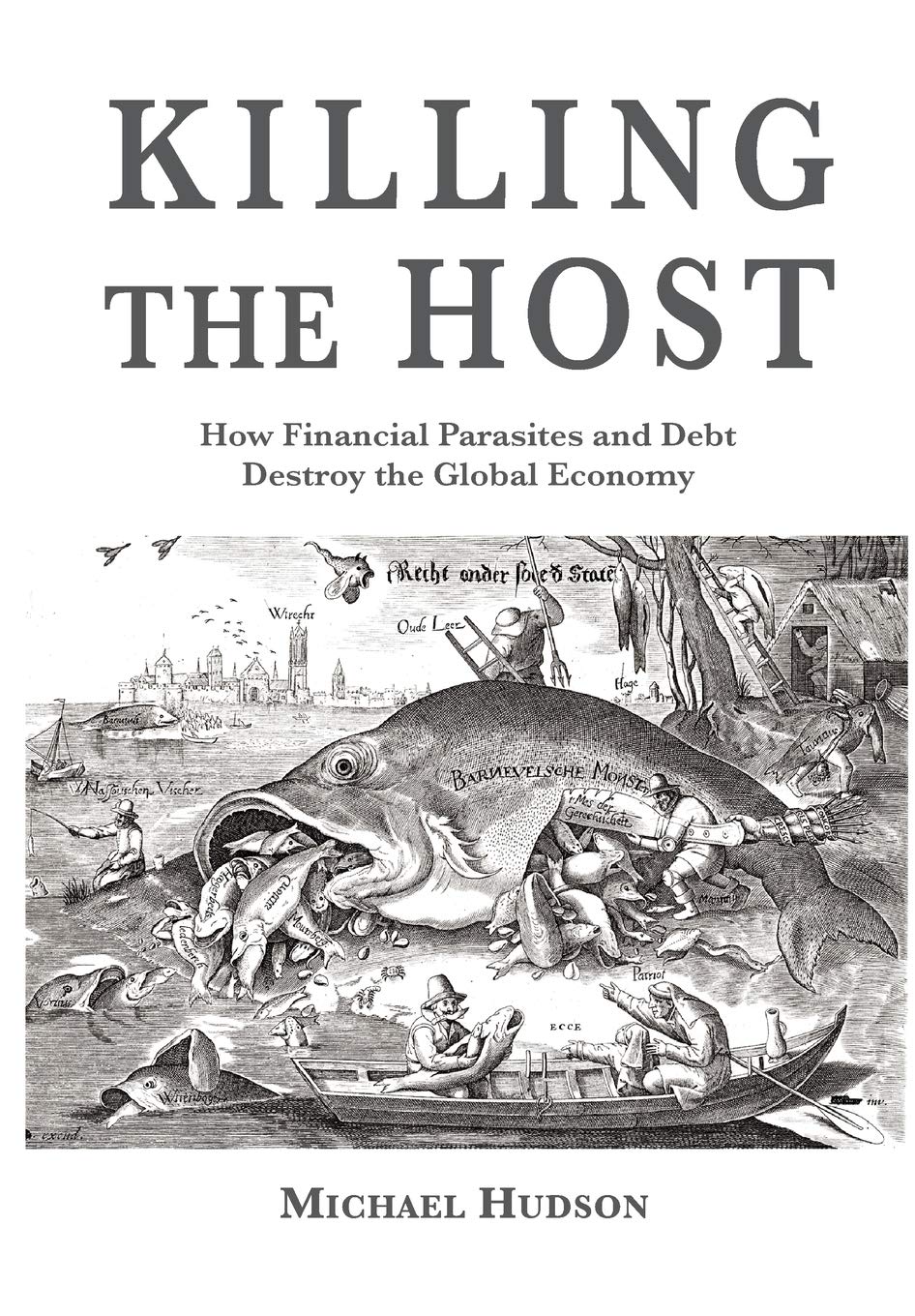
Title

Killing The Host: How Financial Parasites And Debt Bondage Destroy The Global Economy
Delivery time: 8-12 business days (International)
How Financial Parasites And Debt Destroy The Global Economy. Professor Hudson Continues The Discussion On The Financialization Of Capital And Its Global Effects.Killing The Host Exposes How Finance, Insurance, And Real Estate (The Fire Sector) Have Gained Control Of The Global Economy At The Expense Of Industrial Capitalism And Governments. The Fire Sector Is Responsible For Today'S Economic Polarization (The 1% Vs. The 99%) Via Favored Tax Status That Inflates Real Estate Prices While Deflating The Real Economy Of Labor And Production. The Great 2008 Bailout Saved The Banks But Not The Economy, And Plunged The U.S., Irish, Latvian And Greek Economies Into Debt Deflation And Austerity. This Book Describes How The Phenomenon Of Debt Deflation Imposes Austerity On The U.S. And European Economies, Siphoning Wealth And Income Upward To The Financial Sector While Impoverishing The Middle Class.
By changing our most important processes and
products, we have already made a big leap forward. This ranges from the
increased use of more sustainable fibers to the use of more
environmentally friendly printing processes to the development of
efficient waste management in our value chain.
⚠️ WARNING (California Proposition 65):
This product may contain chemicals known to the State of California to cause cancer, birth defects, or other reproductive harm.
For more information, please visit www.P65Warnings.ca.gov.
Shipping & Returns
Shipping
We ship your order within 2–3 business days for USA deliveries and 5–8 business days for international shipments. Once your package has been dispatched from our warehouse, you'll receive an email confirmation with a tracking number, allowing you to track the status of your delivery.
Returns
To facilitate a smooth return process, a Return Authorization (RA) Number is required for all returns. Returns without a valid RA number will be declined and may incur additional fees. You can request an RA number within 15 days of the original delivery date. For more details, please refer to our Return & Refund Policy page.
Shipping & Returns
Shipping
We ship your order within 2–3 business days for USA deliveries and 5–8 business days for international shipments. Once your package has been dispatched from our warehouse, you'll receive an email confirmation with a tracking number, allowing you to track the status of your delivery.
Returns
To facilitate a smooth return process, a Return Authorization (RA) Number is required for all returns. Returns without a valid RA number will be declined and may incur additional fees. You can request an RA number within 15 days of the original delivery date. For more details, please refer to our Return & Refund Policy page.
Warranty
We provide a 2-year limited warranty, from the date of purchase for all our products.
If you believe you have received a defective product, or are experiencing any problems with your product, please contact us.
This warranty strictly does not cover damages that arose from negligence, misuse, wear and tear, or not in accordance with product instructions (dropping the product, etc.).
Warranty
We provide a 2-year limited warranty, from the date of purchase for all our products.
If you believe you have received a defective product, or are experiencing any problems with your product, please contact us.
This warranty strictly does not cover damages that arose from negligence, misuse, wear and tear, or not in accordance with product instructions (dropping the product, etc.).
Secure Payment
Your payment information is processed securely. We do not store credit card details nor have access to your credit card information.
We accept payments with :
Visa, MasterCard, American Express, Paypal, Shopify Payments, Shop Pay and more.
Secure Payment
Your payment information is processed securely. We do not store credit card details nor have access to your credit card information.
We accept payments with :
Visa, MasterCard, American Express, Paypal, Shopify Payments, Shop Pay and more.
Related Products
You may also like
Frequently Asked Questions
- Q: What is the main topic of 'Killing the Host'? A: 'Killing the Host' discusses how financial parasites and debt influence the global economy, emphasizing the impact of the finance, insurance, and real estate (FIRE) sector.
- Q: Who is the author of this book? A: The author of 'Killing the Host' is Michael Hudson, a professor known for his work on economic theories and financial practices.
- Q: What are the key themes explored in this book? A: Key themes include the financialization of capital, economic polarization, debt deflation, and the implications of austerity measures on economies.
- Q: How many pages does 'Killing the Host' have? A: 'Killing the Host' contains 440 pages, providing an in-depth analysis of its subjects.
- Q: What is the binding type of this book? A: 'Killing the Host' is available in paperback binding, making it suitable for both reading and shelving.
- Q: When was 'Killing the Host' published? A: 'Killing the Host' was published on August 20, 2015.
- Q: Is this book suitable for someone new to economic theory? A: Yes, 'Killing the Host' provides a comprehensive overview of contemporary economic issues, making it accessible for those new to economic theory.
- Q: What edition of the book is available? A: 'Killing the Host' is available in its First Edition.
- Q: What condition is the book in? A: 'Killing the Host' is listed as new, ensuring that readers receive a quality product.
- Q: Does the book discuss the 2008 financial crisis? A: Yes, 'Killing the Host' analyzes the 2008 financial crisis, particularly the bailout of banks and its consequences on the economy.
